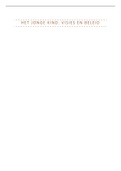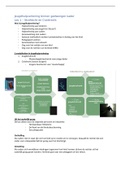HET JONGE KIND: VISIES EN BELEID
, INHOUDSOPGAVE
week 1 ............................................................................................................................................................ 3
week 2 ............................................................................................................................................................ 4
week 3 ............................................................................................................................................................ 7
Week 4 ......................................................................................................................................................... 11
week 5 .......................................................................................................................................................... 14
Responsiecollege .......................................................................................................................................... 18
Artikelen ....................................................................................................................................................... 19
SCP-rapport: Kijk op kinderopvang. hieruit alleen hoofdstuk 2: Recente ontwikkelingen in het beleid
rondom kinderopvang (p.41 - 58). ................................................................................................................ 19
Vandenbroeck, M. (2020). Early Childhood Care and Education Policies that Make a Difference. In:
Nieuwenhuis, R., Van Lancker, W. (eds.) The Palgrave Handbook of Family Policy. Palgrave Macmillan,
Cham............................................................................................................................................................. 20
FukkinK, R., Jillink, L. & Oostdam, R. (2017). A meta-analysis of the impact of early childhood interventions
on the development of children in the Netherlands: an inconvenient truth? European Early Childhood
Education Research Journal, 25 (5), 656-666 ............................................................................................... 20
Haslip, M.J. & Gullo, D.F. (2018). The Changing Landscape of Early Childhood Education: Implications for
Policy and Practice. Early Childhood Education Journal, 46, 249-264. ......................................................... 21
Hawkins, K. (2014). Teaching for social justice, social responsibility and social inclusion: a respectful
pedagogy for twenty-first century early childhood education. European Early Childhood Education
Research Journal, 22 (5), 723-738 ................................................................................................................ 21
Nolan, A. (2021). Addressing inequality: Educators responding to the contexts of young childrens' lives?
Children & Society, 35 (4), 519-533 .............................................................................................................. 22
Redman, T., Harrison, L.J. & Djonov, E. (2022). Education versus care for infants and toddlers: the
Australan early childhood challenge. Early Child Development and Care, 192 (13), 2118-2127 ................. 22
Torr, J. (2019). Infants' Experiences of Shared Reading with their Educators in Early Childhood Education
and Care Centres: An Observational Study. Early Childhood Education Journal, 47, 519-529 ..................... 23
Vandenbroeck, M., De Visscher, S., Van Nuffel, K. & Ferla, J. (2008). Mothers' search for infant child care:
the dynamic relationship between availability and desirability in a continental European welfare state.
Early Childhood Research Quarterly, 23, 245-258. ....................................................................................... 23
Wyslowska, O. & Slot, P.L. (2020). Structural and Process Quality in Early Childhood Education and Care
Provisions in Poland and the Netherlands: A Cross-National Study Using Cluster Analysis. Early Education
and Development, 31 (4), 524-540. .............................................................................................................. 24
2
, WEEK 1
Kinderopvang onder de loep!
Vanaf 2e helft 20e eeuw meer aandacht voor het jonge kind -> leidt tot een aantal spanningsvelden
- Professionaliteit, kwaliteitszorg en (onbereflecteerde) vanzelfsprekendheid
- Moderne opvattingen en tradities (of: continuïteit en discontinuïteit)
Drie functies van kinderopvang
1. Economische functie: ouders kunnen deelnemen aan arbeidsmarkt
2. Pedagogische (of: educatieve) functie: kinderen worden verzorgd, begeleid en ondersteund in
hun (brede) ontwikkeling
3. Sociale functie: samenleving wordt minder ongelijk/oneerlijk: voorziening voor iedereen, meer
kansen voor achterstandskinderen
Michel Foucault (1926-1984)
- Macht/machtsrelaties bepalen “wat telt” als relevante of belangrijke vraagstukken
- Kennis is macht -> maar niet alle macht is gebaseerd op (wetenschappelijke) kennis
- Macht: niet alleen repressief/onderdrukkend, maar ook producerend, sturend, controlerend,
“disciplinerend”
- (Dominant) discours: = gangbare, geaccepteerde manier van kijken, categoriseren, benoemen,
denken, kiezen en oordelen. Voorbeeld: over pedagogische kwaliteit & professionaliteit
1. Praktijk
o Wat is ‘goed’ voor kinderen van bepaalde leeftijd?
o Wat moet er dus gebeuren door (professionele) opvoeders?
o Hoe bewaken (‘borgen’) we dat dat ook echt gebeurt?
2. Wetenschappelijk onderzoek
o Methodologie: hoe onderzoeken we pedagogische kwaliteit en
professionaliteit?
o Welke consequenties heeft een bepaalde manier van onderzoek doen? Wat
zien we daardoor wel/niet?
‘Power produces practices in many fields, including education (..); determining how problems are
constituted, how people are classified and what are considered appropriate ways to shape behaviour’.
3





